Since a group of armed militants overtook the Malheur National Wildlife Refuge in Eastern Oregon at the start of 2016, questions have swirled about what exactly is going on and why. The occupation took a turn Tuesday night when several people involved in the armed occupation were arrested and one was killed during the arrests.
Here is a look at some of the key players and the issues central to understanding the ongoing situation in Burns.
The Occupiers
Ammon Bundy
Ammon Bundy is the face and lead decision maker for the militants involved in the occupation. He's the son of Nevada rancher Cliven Bundy, and is usually seen wearing a plaid shirt-coat, wide-brimmed hat and precise beard. He helped his father in a 2014 standoff between militants and the Bureau of Land Management in Nevada.
In Burns, Oregon, Bundy serves as a liaison between the militants and those outside the occupation. He regularly holds press conferences, urges more people to join his cause and even leads prayer circles inside the refuge. Bundy met with Harney County Sheriff David Ward in the early days of the occupation and recently opened, and then closed, a negotiation with the FBI.
Bundy was arrested Tuesday afternoon on a highway between Burns and John Day and faces a felony charge of "conspiracy to impede officers of the United States from discharging their official duties through the use of force, intimidation, or threats, in violation of Title 18, United States Code, Section 372."

Ryan Bundy told OPB that he and the other armed men occupying the Malheur National Wildlife Refuge headquarters will leave if Harney County residents want them to. The self-proclaimed militiamen took over the buildings since Saturday, Jan. 2.
Amanda Peacher / OPB
Ryan Bundy
Ammon Bundy's older brother, Ryan Bundy, has stood as the leader's right hand. On the fourth day of the occupation, Ryan Bundy said the militants would end the occupation if the Harney County community requested it.
"We can't be here and force this on them," Ryan Bundy told OPB. "If they don't want to retrieve their rights, and if the county people tell us to leave, we'll leave."
However, Bundy quickly recanted his statement. He has also touted the occupiers' guns as reason to take them seriously, while also saying the militants don't want violence.
Bundy, along with his brother Ammon, was arrested Tuesday afternoon on a highway between Burns and John Day and faces a felony charge of "conspiracy to impede officers of the United States from discharging their official duties through the use of force, intimidation, or threats, in violation of Title 18, United States Code, Section 372."
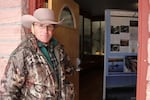
Protester LaVoy Finicum from Arizona was fatally shot by law enforcement officials on Jan. 26 during a traffic stop. Finicum was part of an armed occupation of the Malheur National Wildlife Refuge.
Amanda Peacher / OPB
LaVoy Finicum
Arizona rancher LaVoy Finicum became a de facto spokesman for the armed militants as the occupation wore on. In the early days, he hinted at plans to return home to his ranch, later squashing the very thought of it.
Finicum spoke out against the presence of the Pacific Patriots Network at the refuge upon its arrival, telling them to put away their weapons. He also staged a press tour of sorts to spread the militants' message to other parts of the west, traveling freely from the refuge to Utah and back. Finicum's foster children were removed from his home, at least partially due to his involvement in the occupation.
According to several sources, Finicum was killed during the arrests of five of his fellow occupiers Tuesday, Jan. 26, on Highway 395 in Oregon.
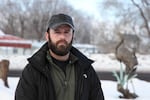
Ryan Payne is a veteran from Montana who participated in the struggle between the Bundy family and the BLM in Southern Nevada.
Amanda Peacher / OPB
Ryan Payne
At the start of the occupation, Ryan Payne said Dwight and Steven Hammond were "being brutally oppressed" and he would do "whatever it takes" to support them. Payne is a veteran of the Iraq war, and helped organize the armed standoff with the BLM on Cliven Bundy's ranch in 2014.
Payne, now an electrician from Montana, had been in Burns for about a month before the occupation began to speak with residents, as well as the Hammond family. Payne and Ammon Bundy helped form the Harney County Committee of Safety. Payne has been in charge of security at the refuge since the occupation began.
Payne was also arrested Tuesday afternoon on a highway between Burns and John Day and faces a felony charge of "conspiracy to impede officers of the United States from discharging their official duties through the use of force, intimidation, or threats, in violation of Title 18, United States Code, Section 372."
Other Players

Dwight and Steven Hammond.
U.S. Department of Justice
Dwight and Steven Hammond
Dwight and Steven Hammond symbolize the starting point of the occupation — sort of. The father and son were convicted of arson on federal land in 2012. After serving their original prison sentences, the Hammonds were re-sentenced to five years apiece in October of last year under federal mandatory minimum laws.
Ammon Bundy, as well as other occupiers, regularly cite unfairness toward in the Hammonds' sentencing as a defense of the occupation. On Jan. 21, Bundy said the safe return of the Hammonds to their homes was a necessary part of any agreement struck between the occupiers and the federal government to end the occupation.
The Bureau of Land Management has considered reinstating the family's grazing rights since May 2015, but has yet to disclose whether the occupation has affected its decision-making process.
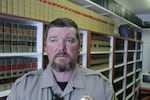
Armed occupiers have disrupted community life for residents in Burns, Oregon, said Harney County Sheriff David Ward.
Amanda Peacher / OPB
Harney County Sheriff David Ward
Sheriff David Ward has led public safety efforts in the county during the occupation. Since the Bundy brothers and their followers seized the refuge, more law enforcement officials have entered Harney County to help handle the situation, but Ward continues to be the public face of law enforcement.
At times, Ward has drawn criticism for not taking more action against the militants, but he continues to reiterate the FBI is responsible for managing the occupation. Ward has had several discussions with Ammon Bundy and the Pacific Patriots Network. He's also led multiple community meetings calling for the occupation's end.
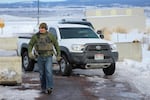
An FBI guard guides a truck out of the compound near the Burns Airport.
John Sepulvado / OPB
FBI
The FBI has kept a low profile. Toward the start of the occupation, OPB reported the FBI is creating a criminal case against the militants. The bureau is leading the law enforcement operation in Harney County, but maintained a nearly invisible presence until the occupation neared its third week. FBI officials have said they are taking a measured approach to the situation to prevent a shootout like in Ruby Ridge, Idaho or Waco, Texas.
Protesters from the refuge first confronted FBI agents Jan. 16, and a negotiator spoke by phone with Ammon Bundy Jan. 21. Bundy briefly spoke to the FBI again the next day, and said he wouldn't negotiate an end to the occupation unless the FBI met with him in person.
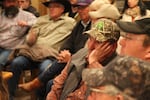
Fourth generation Harney County rancher Scott Franklin listened to the Bundy brothers Monday night in Crane, Oregon.
Conrad Wilson / OPB
The Community
The people of Burns and the surrounding area said they did not expect this to happen in their community. The occupation thrust the quiet Oregon community into the center of a whirlwind of activity. Men with guns entered their community. Government employees in Harney County have grown fearful. The media spotlight burns feverishly bright. And none of the residents know when the storm will end.
In meeting after meeting, community members have called for militants to leave. Yet, some have begun to voice support for the occupation as a possible impetus for change. Many other say they feel, regardless of the occupation, the Hammonds were too harshly sentenced for their crimes.
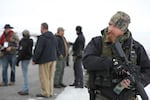
An armed man with a group called the Pacific Patriots Network. The network arrived in Harney County Saturday, Jan. 9, claiming to secure the scene of the occupation at the Malheur National Wildlife Refuge.
Dave Blanchard / OPB
Pacific Patriots Network
The Pacific Patriots Network was part of the initial rally in support of the Hammonds from which the Bundys broke away to take over the wildlife refuge. The network resurfaced Jan. 9, when members arrived at refuge grounds carrying long guns. LaVoy Finicum said their presence and support were welcomed and appreciated by the occupiers, but urged them to put away their guns. The militants eventually asked the network to leave. In a meeting with Sheriff David Ward, members of the network vowed to remain in Burns and serve as a "neutral moderating space" between the occupiers and law enforcement.
The Issues

Tom Sharp with his horse, "Buck" at his ranch outside of Burns.
Amanda Peacher / OPB
Land Management
Since seizing the wildlife refuge, militants have removed fences dividing federal property from bordering ranchland, plowed new roads, and re-branded the refuge as the "Harney County Resource Center."
Nearly half of the land in the American West is owned by the federal government, and the occupiers think it should not be so. Ammon Bundy and other occupiers have repeatedly said they won't leave until the refuge land is turned over to Harney County.
"We are very strong, very firm, this facility will not go back to the federal government, ever," militant LaVoy Finicum said.
The militants have also repeatedly said ranchers in Harney County have been mistreated by federal agencies in the past when it comes to leasing the land for activities like cattle grazing.
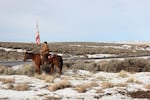
Duane Ehmer patrols the Malheur National Wildlife Refuge complex with his horse Hell Boy during the occupation of the refuge in early 2016.
Amanda Peacher / OPB
Role of Government
The militants are vehemently anti-federal government. Many carry copies of the U.S. Constitution, which they claim supersedes all other laws; they also say the federal government does not follow the founding document. The question is whether the militants truly believe the federal government does not work, or that it does not work for them.
OPB's John Sepulvado described the militants' ideology in a collaborative story with Willamette Week:
“Even one day spent bivouacked with these militants reveals a sketch, if not a fully formed picture, of a group of people searching for meaning and eager for attention from the media they profess to hate. Their ideology, a mash-up of radical Mormonism and militaristic fantasy, is a distillation of the frustration of people who've been marginalized by a world in which they do not fit.”
The militants have convened a citizens' grand jury in an effort to go after and convict those they feel have broken constitutional law. As Sepulvado explained, these citizen juries are based off the Bible, English common law and in some cases, the Book of Mormon. These citizen grand juries are not legal under federal or state law, but militants will often carry out actions against people indicted by these juries through intimidation and harassment. As Sepulvado noted, sometimes these indictments can get brutal, including kidnappings and in one instance, a physical beating.
The militants' distrust of the federal government is an idea that has helped them connect with some people in Harney County. Even employees of the federal government and Sheriff David Ward have said at times they've felt frustration with aspects of the federal government, even if they don't support the occupation.

Candy Tiller was born in Harney County where her family raises cattle.
Conrad Wilson / OPB
Economics
The declining rural economy in Harney County has made many in the area sympathetic to issues raised by the militants. Harney County has enough land (and few enough people) for each resident to own more than a square mile.
Timber used to be the primary industry, but Harney County has lost 99 percent of its wood products jobs since 1978. Now, a large portion of the remaining jobs in the county are government positions — more than 40 percent. This has created divisions within the Burns community. Harney County residents may have many frustrations with state and federal government, but they also understand the importance of the government in their daily lives.
What People Are Saying

Oregon Gov. Kate Brown spoke to the public at the 2015 Armed Forces Commemoration outside the capitol building in Salem on Thursday, May 14, 2015.
Alan Sylvestre / OPB
Oregon Gov. Kate Brown
In the third week of the occupation, Oregon's Democratic governor loudly decried what she called a "spectacle of lawlessness" displayed by the Bundy brothers and their followers. She told OPB's Kate Davidson on All Things Considered she was advised to limit comments on the occupation at its onset, but decided to speak out.
"The situation is absolutely intolerable," she said. "The very fabric of the Burns community is being ripped apart by this occupation."
Brown estimates the occupation is costing $100,000 a week just in law enforcement and has requested federal reimbursement. She even wrote to President Obama, the U.S. attorney general and the director of the FBI to urge action.
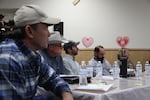
Members of the Harney County Committee of Safety meet to discuss the ongoing occupation in Burns on Jan. 8, 2015.
Dave Blanchard / OPB
The Community
Burns residents have said repeatedly they want the militants to go home — even though some of them agree with land management issues central to the occupation. As the situation continues, community response has developed a sharper tone as fatigue sets in. Anti-occupation protests outside of Burns have sprouted as well.
The Harney County Committee of Safety, which Ammon Bundy helped organize, came together to ask the militants to leave.
"We feel that any good which may come out of this event has reached its full potential,” board member Melodi Molt said. “We ask that you organize your people, explain that your point has been made and leave in a peaceful, honorable fashion."
The Bundys and a handful of other militants came to a separate Harney County community meeting, where residents directed comments directly to the occupiers.
“You should just go home, and I hope somebody catches you on the way, and you go to jail where you deserve to be,” said Isabelle Fleuraud, a Burns resident, pointing to the Bundys.
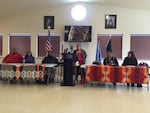
The Burns Paiute tribe denounced the armed occupation of the Malheur refuge.
Amanda Peacher / OPB
Burns Paiute Tribe
The Burns Paiute Tribe, too, have denounced the occupation. The Malheur National Wildlife Refuge is within the Paiute tribes' ancestral territory in southeastern Oregon. Tribal Chair Charlotte Rodrique said they see the federal employees maintaining the refuge as partners and "a protector of our cultural sites."
Ammon Bundy later responded to the tribes' comments, saying he wants them to be "free from the federal government as well."
Activities at the refuge by the militants have possibly damaged tribal artifacts. Rodrique describes the militants as "ramrodding their way through things and possibly being destructive."
Lawmakers
A number of state and federal officials have spoken in support of both sides of the occupation. Congressman Greg Walden, R-Oregon, said he understands the frustrations felt by rural Oregonians (and other rural Americans, to an extent) when it comes to the role of the federal government, but pointed out in an impassioned speech on the floor of the U.S. House that the occupation is unlawful and the militants are in the wrong.
In- and out-of-state lawmakers have voiced support for the militants cause, with some of them even visiting the refuge. Nevada state Rep. Michele Fiore, a Republican and longtime supporter of Nevada rancher Cliven Bundy and his family, has spoken on the phone with Ammon Bundy. Oregon state Rep. Dallas Heard, R-Roseburg, visited the refuge.
Congressman Earl Blumenauer, D-Oregon, and Sen. Ron Wyden, D-Oregon, have also voiced opposition to the occupation.
